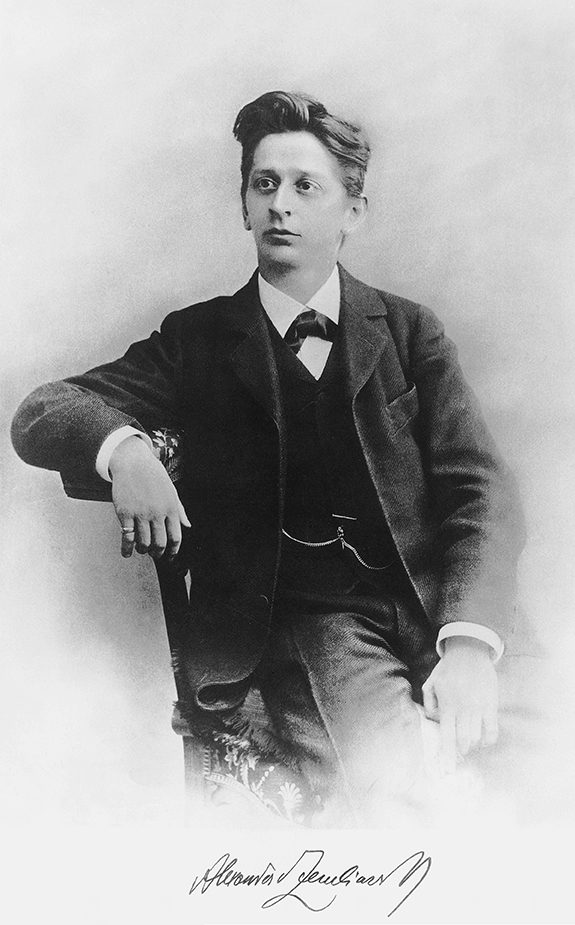Composed c.1902-3; 9 minutes
Zemlinsky’s composition centers on his seven completed operas, with four string quartets spanning his composing career. In 1906, Schoenberg married Zemlinsky’s sister, Mathilde and, shortly afterwards, Zemlinsky became involved with Alma Schindler in an intense, unhappy relationship which ended with Alma’s marriage to Mahler. Zemlinsky’s music then went through a darker phase for five years, brooding upon the love affair. The song Maiblumen blühten überall (Mayflowers blossomed everywhere) comes from this period as an incomplete – yet self-contained – setting of a poem by German poet Richard Dehmel. Both Zemlinsky in his setting for soprano and string sextet (c.1902-3) and Schoenberg in his string sextet Verklärte Nacht (Transfigured Night) (1899) share something of the zeitgeist in Dehmel's progressive and then sometimes shocking blend of deeply humane socialism and erotic candor. Maiblumen tells a tragic tale of two overworked young farm workers finding love—and death—in the fields they toiled in. Dehmel’s poem Die Magd (The Maiden) further develops the story, but Zemlinsky’s setting ends with the death of the young man.
Maiblumen blühten überall (Mayflowers blossomed everywhere)
Maiblumen blühten überall;
er sah mich an, so trüb und müd.
Im Faulbaum rief eine Nachtigall:
die Blüthe flieht! die Blüthe flieht!
Von Duften war die Nacht so warm,
so warm wie Blut, wie unser Blut;
May flowers bloomed around us;
he looked at me, so sad and exhausted.
A nightingale sang in the buckthorn:
the blossom flees! the blossom flees!
The night was warm with scents,
as warm as blood, like our blood;
und wir so jung und freudenarm.
Und über uns im Busch das Lied,
das schluchzende Lied; die Glut verglüht!
Und er so treu und mir so gut.
In Knospen schoß der wilde Mohn,
es sog die Sonne unsern Schweiß.
Es wurden rot die Knospen schon,
da wurden meine Wangen weiß.
Ums liebe Brot, ums teure Brot
floß doppelt heiß ins Korn sein Schweiß.
Der milde Mohn stand feuerrot;
es war wohl fressendes Gift der Schweiß,
auch seine Wangen wurden weiß,
und die Sonne stach im Korn ihn tot.
and we are so young and devoid of joy.
And above us in the bush the song,
the sobbing song; the embers burn out!
And he is so faithful and so good to me.
The wild poppy sprouted in buds,
the sun burned our sweat.
The buds were already turning red,
then my cheeks turned white.
For our bread, for our daily bread
His sweat flowed twice as hot into the grain.
The wild poppies stood fiery red;
his sweat became a corrosive poison,
even his cheeks turned white,
and in the cornfield, the sun struck him dead.

“It’s bursting with talent,” Brahms said of the young Alexander Zemlinsky’s String Quintet when it was played in Vienna in 1896. Brahms’s influence was strong in the early music of the Vienna-born younger composer and Zemlinsky was to uphold and nurture the tradition throughout his life. Where Arnold Schoenberg, just three years younger and whom Zemlinsky taught for a while, felt the need to find a revolutionary new path in music, Zemlinsky preferred to hold onto deeply romantic, even hyper-romantic ideals, in the pursuit of his own musical voice. Zemlinsky wrote to Schoenberg in 1902: “A great artist who possesses everything needed to express the essentials, must respect the boundaries of beauty, even if he extends them far further than hitherto.” As a result of Zemlinsky’s struggle between tradition and independence, there is a tension in his music that is palpable. His distinctly intense, densely argued music has struggled to find a place in the repertoire since his death in New York as a refugee in 1942. A slow, if steady, revival of interest has taken place since the 1970s.